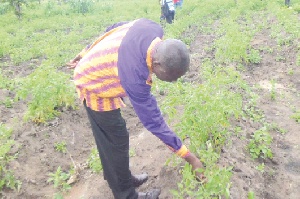The Adventist Development and Relief Agency (ADRA) Ghana has trained 27 new Volunteer Extension Workers (VEWs) in the Northern Region to assist farmers with new agricultural technologies as part of efforts to ensure improved yields and food security.
This brings to 400 the number of people who have volunteered and trained to assist the Agriculture Extension Agency (AEA) in their various districts to educate about 10,000 farmers on the right application of fertilizer, as well as cost-effective and scalable models for the cultivation of maize, soya beans and rice.
The volunteer extension workers were selected from Mion, Central Gonja, West Gonja, Bole, Sawla-Tuna-Kalba, East Gonja, Yendi, Zabzugu, Tatale as well as West Gonja, and were taken through topics such as: volunteerism techniques; importance of agriculture extension delivery; adult education methodologies; soil fertility improvement and crop production techniques.
The Volunteer Extension Workers programme is intended to facilitate agricultural extension service delivery in areas where professionally trained extension workers are scarce.
The three-year project is being implemented by ADRA-Ghana under the Integrated Agricultural Productivity Improvement and Marketing Project (INTAPIMP) through the Alliance for Green Revolution in Africa (AGRA), with funding from DANIDA and the Rockefeller Foundation.
INTAPIMP is a project that complements the agricultural value chain mentorship project (AVCMP) to achieve the targetted coverage and goal of the DANIDA-funded agricultural value chain facility (AVCF).
Speaking at the opening ceremony in Tamale, Mr. Luke Nayi Nindow, Northern Regional Agricultural Extension Officer of Department of Agriculture, noted that the programme has come at a time when there is shortage of Agricultural Extension Agents in most communities of the three northern regions, which has led to low production of food crops amidst rising demand for lands and other resources for agribusiness.
“Properly utilised volunteering can play an effective role in helping ADRA fulfil its humanitarian mission, and create a deeper understanding of humanitarian work among ADRA supporters,” he said.
Effective volunteering, he explained, however requires volunteers to be aware of the volunteer opportunity and their responsibilities as a volunteer.
He urged the beneficiaries to show commitment in the work and also be abreast with information to educate the farmers well so as to ensure the project’s sustainability.
Mr. Samuel Asante-Mensah Director for Agriculture and Food security ADRA-Ghana, said extension officers require logistics to make them efficient in reaching the remotest areas of the country.
Mr. Asante-Mensah said Agricultural Extension Agents in the region continue to dwindle due to government’s inability to recruit new or even build the capacity of the existing ones, which makes access to farmers very low.
The Project Manager of INTAPIMP, Isaac Kankam-Boadu, explained that volunteers will be required to collaborate with the few extension agents in the regions to help farmers increase productivity and income from their agribusiness.
He said the volunteers will periodically visit the farms to offer technical support, supervise farmers’ field operations, and educate them on practical and simple sets of technologies which conserve resources.
“They will also ensure the availability of fertiliser to enable the farmers access the farming input in time to apply at the right time and in right quantities,” he added.
Mr. Kankam-Boadu said an annual award scheme has been instituted to motivate the best volunteer worker during the annual Farmers’ Day celebration at the district level, after a thorough assessment of the volunteers’ performance.
He said the workshop will build the capacity of participants through the strengthening and development of farmer associations and in the implementation of simple business plans.
Each of the trainees received a certificate, a pair of Wellington boots, a cutlass, crop production manuals and a set of stationery for record-keeping.
Business News of Friday, 12 June 2015
Source: B&FT













